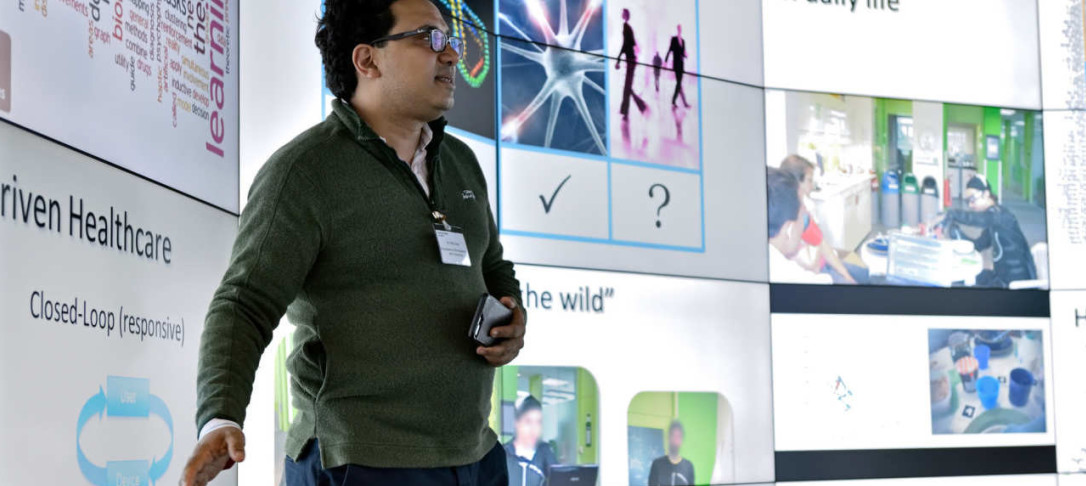
As part of our Bioeng COVID-19 Virtual Seminars series, join us for a seminar given by Professor Aldo Faisal who will give us an insight into his work in Artificial Intelligence (AI) and how it ties in with current COVID-19 research efforts.
______
Abstract:
In order to manage the COVID-19 outbreak sustainably, clinicians worldwide need to understand how patients’ states will evolve over the next hours and days given the information they have already available, e.g. in the form of Electronic Health Records (EHR). We developed pre-Covid an algorithm, the AI Clinician, that provides suggested doses of intravenous fluids and vasopressors in sepsis. We use reinforcement learning, as it enables us to model and learn complex sequential decision-making problems such as the dynamic medical treatment of a patient in a natural way (Komorowski et Faisal, 2018, Nature Medicine; Gottesman, et Faisal, 2019…, Nature Medicine). Crucially, in the current pandemic, reports on the clinical course of inpatients with COVID-19 show that sepsis is a major part of severe cases, with upto 100% of non-survivors being affected by it, not surprising as multi-organ failure go hand in hand with sepsis (Zhou et. al. 2020). Improving patient survival through better prediction of patient disease dynamics (i.e. deterioration) and decision support would lead to better management of medical resources during these difficult times, and lives saved, as well as helping intensive care clinicians to better understand the disease and treatment itself. Using state-of-the-art tools in machine learning and AI we aim to map the current COVID19 pandemic to better understand the longitudinal critical care disease trajectory in infected ventilated patients in order to provide clinicians with prediction models of survival, deterioration, and intervention success.
Biography:
 Professor Aldo Faisal read Computer Science and Physics in Germany, where he wrote his Diplomarbeit (M.Sc. thesis) in non-linear dynamical systems and neural networks (with Helge Ritter). He moved on to study Biology at Cambridge University (Emmanuel College) and wrote his M.Phil. thesis on the electrophysiological and behavioural study of a complex motor behaviour in freely moving insects with Tom Matheson in the group of Malcolm Burrow FRS. For his Ph.D. he joined Simon Laughlin FRS group at the Zoology Department in Cambridge investigating the biophysical sources of neuronal variability. He was elected a Junior Research Fellow at Cambridge University (Wolfson College) and joined the Computational & Biological Learning Group (Engineering Department) to work with Daniel Wolpert FRS on human sensorimotor control. Between and after his studies he gained insights into strategic mangement consulting with McKinsey & Co. and as a “quant” with the investment bank Credit Suisse. In winter 2009 Aldo setup the Brain & Behaviour Lab at Imperial College to pursue a research program that aims at understanding the brain with principles from engineering which often immediately translates into direct technological applications for patients and society.
Professor Aldo Faisal read Computer Science and Physics in Germany, where he wrote his Diplomarbeit (M.Sc. thesis) in non-linear dynamical systems and neural networks (with Helge Ritter). He moved on to study Biology at Cambridge University (Emmanuel College) and wrote his M.Phil. thesis on the electrophysiological and behavioural study of a complex motor behaviour in freely moving insects with Tom Matheson in the group of Malcolm Burrow FRS. For his Ph.D. he joined Simon Laughlin FRS group at the Zoology Department in Cambridge investigating the biophysical sources of neuronal variability. He was elected a Junior Research Fellow at Cambridge University (Wolfson College) and joined the Computational & Biological Learning Group (Engineering Department) to work with Daniel Wolpert FRS on human sensorimotor control. Between and after his studies he gained insights into strategic mangement consulting with McKinsey & Co. and as a “quant” with the investment bank Credit Suisse. In winter 2009 Aldo setup the Brain & Behaviour Lab at Imperial College to pursue a research program that aims at understanding the brain with principles from engineering which often immediately translates into direct technological applications for patients and society.